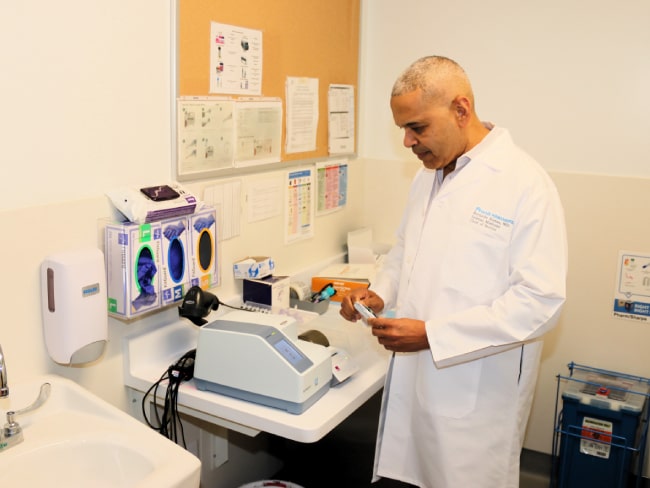Kaiser Permanente cancer survival rates higher
Study shows that Kaiser Permanente survival rates were consistently higher for breast, colorectal, and lung cancer than national rates overall.
PASADENA, Calif. — Kaiser Permanente had better 5-year survival rates among breast, colorectal, and lung cancer patients compared to the National Cancer Institute’s Surveillance, Epidemiology, and End Results (SEER) estimates, according to new research published September 19, 2023, in The Permanente Journal.
Researchers in all 8 Kaiser Permanente regions worked together on this study. They compared the occurrence of cancer based on age, as well as the survival rate, for patients diagnosed with cancer at Kaiser Permanente to national statistics of occurrence and survival produced by the NCI’s SEER Program. SEER is a coordinated system of cancer registries across the United States that collects data on every case of cancer reported in 19 geographic areas, covering about 35% of the U.S. population.
“Our research found that breast cancer incidence rates — meaning discovery of new cases of cancer — were consistently higher for Kaiser Permanente than for SEER, and that colorectal and lung cancer incidence rates were lower. In addition, survival rates from these 3 cancers — breast, colorectal, and lung — were consistently higher than national estimates,” said the study’s co-lead author Erin E. Hahn, PhD, of the Kaiser Permanente Southern California Department of Research & Evaluation. “We believe that Kaiser Permanente’s focus on cancer prevention and cancer screening, use of cancer treatment pathways based on national guidelines, and use of a consistent electronic health record system that enables guideline-based care, protocols, and coordination of care across the cancer care continuum may have played a role in higher survival rates.”
Kaiser Permanente is an integrated health care organization with 12.7 million members. Researchers included all patients enrolled in all 8 Kaiser Permanente regions (Southern California, Northern California, Northwest — which includes portions of Oregon and Washington — Washington, Hawaii, Colorado, Georgia, and Mid-Atlantic States — which includes Maryland, Virginia, and Washington, D.C.). Then researchers followed the Kaiser Permanente patients diagnosed from 1999 to 2013 to determine 5-year survival rates.
Researchers compared both the rate of cancer incidence and the rate of survival.
- Kaiser Permanente survival rates were consistently higher than for SEER.
- Incidence rates for all-stage and localized-stage breast cancer were consistently higher for Kaiser Permanente than for SEER, while colorectal and lung cancer rates were lower. Researchers believe that higher incidence rates for localized breast cancer may be due to high screening rates.
- Researchers also parsed out the race and ethnicity of cancer patients at Kaiser Permanente. That analysis did not reveal disparities in the delivery of cancer screening and treatment for breast, colorectal, and lung cancer within Kaiser Permanente.
Researchers said that fluctuations in cancer occurrence and survival may reflect patterns in behaviors associated with cancer risk, such as the decline in smoking, increases in cancer screening, and availability of new treatments. For example, a 2008 spike in colorectal cancer incidence at Kaiser Permanente corresponded to the enterprisewide distribution of at-home colorectal cancer screening tests from 2006 to 2008. That, in turn, may well have led to earlier detection and subsequent improvements in survival seen among Kaiser Permanente members in 2011.
Co-lead author Debra P. Ritzwoller, PhD, of the Kaiser Permanente Colorado Institute for Health Research, said Kaiser Permanente members’ access to preventive care such as smoking cessation programs and cancer screening programs could have affected the findings of the study.
“We believe that this study shows that Kaiser Permanente’s dedication to screening and preventive care, as well as adoption of new treatments, has benefited our members,” she said.
Hahn and Ritzwoller added, though, that the findings should be interpreted cautiously given the differences in patients between Kaiser Permanente and the NCI’s SEER database. The Kaiser Permanente population is an insured, younger, and more racially diverse population than SEER’s aggregated location-specific populations.
About Kaiser Permanente
Kaiser Permanente is committed to helping shape the future of health care. We are recognized as one of America’s leading health care providers and not-for-profit health plans. Founded in 1945, Kaiser Permanente has a mission to provide high-quality, affordable health care services and to improve the health of our members and the communities we serve. We currently serve 12.7 million members in 8 states and the District of Columbia. Care for members and patients is focused on their total health and guided by their personal Permanente Medical Group physicians, specialists, and team of caregivers. Our expert and caring medical teams are empowered and supported by industry-leading technology advances and tools for health promotion, disease prevention, state-of-the-art care delivery, and world-class chronic disease management. Kaiser Permanente is dedicated to care innovations, clinical research, health education, and the support of community health.













